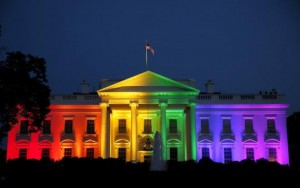Bostock v. Clayton County: An Unexpected Victory
 [The following is a guest post from Alexa Bradley (L’18).]
[The following is a guest post from Alexa Bradley (L’18).]
The days in which same-sex couples could marry on Sunday and be fired on Monday are no longer.
Gone, too, are the days in which a transgender employee could be fired for giving themselves the gift of living their life as the person they were always meant to be. On June 15, 2020, in Bostock v. Clayton County Board of Commissioners, the United States Supreme Court ruled in a 6-3 decision that Title VII’s prohibition of workplace “sex” discrimination clearly encompasses discrimination based on one’s sexual orientation or transgender status because “homosexuality and transgender status are inextricably bound up with sex.” This long-awaited decision was an unexpected victory for the LGBTQi community, of course, but also for the sanctity of Title VII.
Before I get into the weeds of the Bostock opinion, a little background may be helpful. I’ll first explain Title VII and some of the early Supreme Court case law interpreting “sex.” Then, before I explain the opinion itself, I’ll explain how the circuit courts had interpreted “sex” when it came to claims involving sexual orientation and transgender status. Finally, after explaining the majority opinion, I’ll unravel the dissenting arguments.
Title VII Background
Title VII was enacted by Congress in 1964 to address the pervasive problems of employment discrimination and to ensure that, among the other enumerated characteristics, an employee’s “sex” was not relevant to their selection, evaluation, or compensation. According to Meritor Savings Bank, FSB v. Vinson, 477 U.S. 57, 64 (1986), Congress drafted Title VII in broad terms to “strike at the entire spectrum of disparate treatment between men and women.” Since Title VII’s passage, the Court has been tasked on a number of occasions with clarifying the scope of protection provided by Title VII’s ban on “sex” discrimination.
For example, in 1971, the Court held in Phillips v. Martin Marietta Corp., 400 U.S. 542 (1971) (per curiam), that an employer who hired men with school-aged children but would not hire women with school-aged children had engaged in sex discrimination in violation of Title VII. The Court’s decision in Phillips created the “sex-plus” theory of discrimination. Sex-plus discrimination is found when an employer, explicitly or in effect, classifies an employee on the basis of sex plus another characteristic, such as “women who have children.” So, in Ms. Phillips’s case, her employer discriminated against her because she was (A) a woman, who had (B) school aged children. Thus, her employer’s decision was motivated, in part, by Ms. Phillips’s sex, which violates Title VII.
In 1978, the Court considered in Los Angeles Department of Water & Power v. Manhart, 435 U.S. 702 (1978), whether Title VII permitted an employer to require women to make larger contributions to the pension fund than men. The employer argued that the policy was justified because women are likely to live longer than men, so women would receive more over time from the pension fund. However, recognizing Title VII’s clear focus on the individual rather that a group, the Court rejected the employer’s justification. The Court reasoned that it may be true that women, as a whole, live longer than men, but an individual woman may die as early as a man, and that the individual, therefore, is the proper focus for Title VII. Thus, the Court held that an employer engages in sex discrimination in violation of Title VII when the employer uses generalizations or assumptions about an entire class of employees that results in individual disparate treatment.
In 1986, the Court held in Meritor Savings Bank, FSB v. Vinson, 477 U.S. 57 (1986), that claims of workplace sexual harassment fall under the umbrella of “sex discrimination” claims contemplated by Title VII, and in 1989, the Court held in Price Waterhouse v. Hopkins, 490 U.S. 228 (1989), that discrimination on the basis of an employee’s failure to conform to expectations of gender norms – or sex-stereotyping – constitutes “sex” discrimination in violation of Title VII.
Finally, in 1998, in Oncale v. Sundowner Offshore Services, Inc., 523 U.S. 75 (1998), an opinion written by the late Justice Antonin Scalia, the Court found that Title VII’s prohibition on “sex” discrimination applies to cases of workplace harassment between members of the same sex. In so holding, Justice Scalia explained “male-on-male sexual harassment in the workplace was assuredly not the principal evil Congress was concerned with when it enacted Title VII. But statutory prohibitions often go beyond the principal evil to cover reasonably comparable evils, and it is ultimately the provisions of our laws rather than the principal concerns of our legislators by which we are governed.” Id. at 79.
In considering the above-cited opinions, one central theme seems to ring through: “sex” must be interpreted broadly.
This theme becomes unavoidably clear when considered with Congress’ abrupt response to the Court’s holding in General Electric Co. v. Gilbert. 429 U.S. 125 (1976). In Gilbert, the Court found that a company plan that provided nonoccupational sickness and accident benefits to all employees but did not provide such benefits for any absence due to pregnancy did not constitute sex discrimination. In response, Congress passed the Pregnancy Discrimination Act of 1978, which explicitly overturned Gilbert and expanded Title VII’s definition of “sex” to cover “pregnancy, childbirth, and related medical conditions.” 42 U.S.C. § 2000e(k). Congress’ swift action to overturn Gilbert sent a clear message to the Court – the protected characteristics enumerated in Title VII are to be afforded broad interpretations.
How We Got Here
This is the landscape of Supreme Court decisions against which Bostock must be understood.

 To Our Peers, Professors, And Administrators:
To Our Peers, Professors, And Administrators: